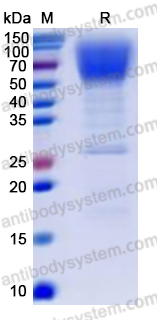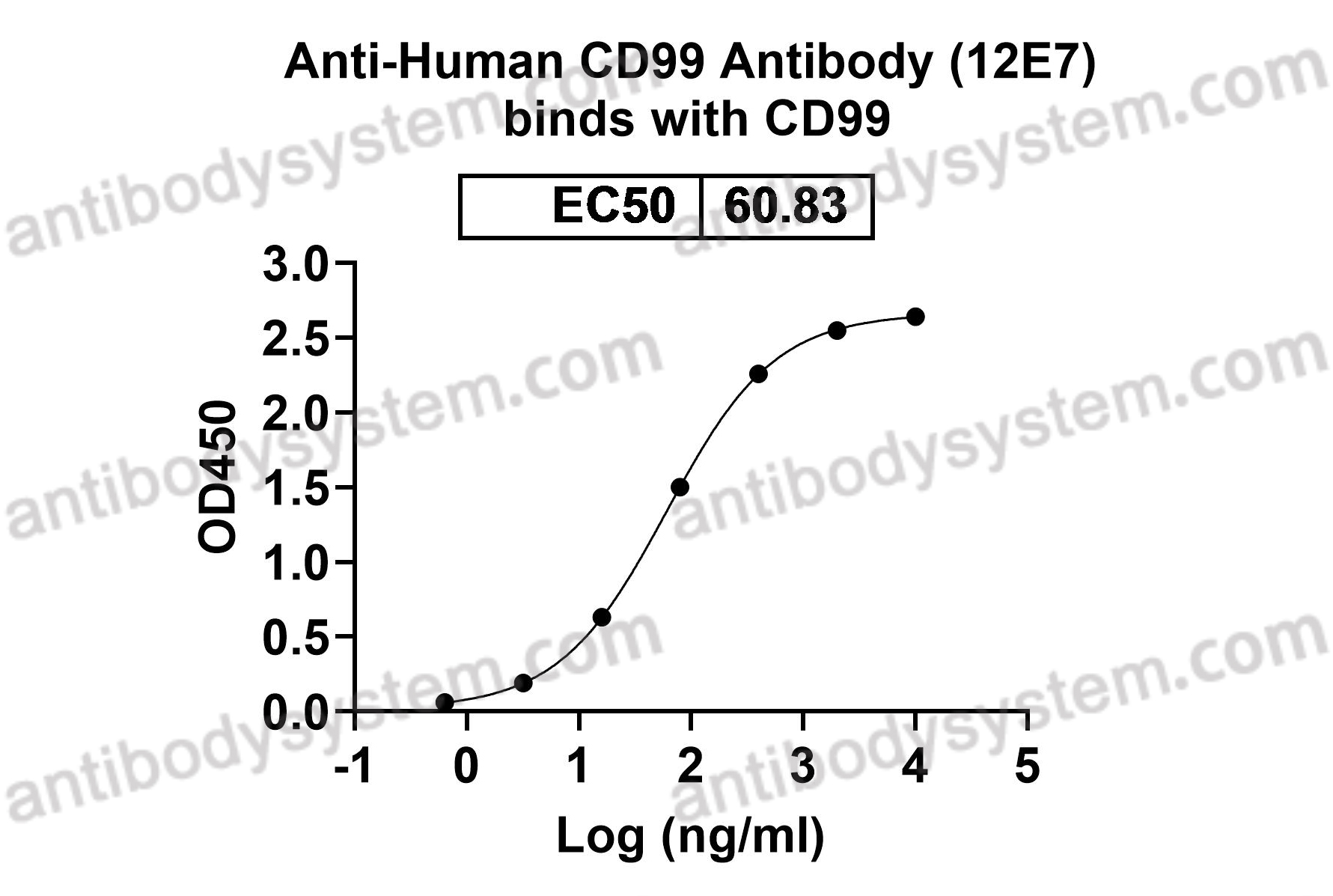Catalog No.
EHD00201
Expression system
Mammalian Cells
Species
Homo sapiens (Human)
Protein length
Met1-Gly428
Predicted molecular weight
48.03 kDa
Nature
Recombinant
Endotoxin level
Please contact with the lab for this information.
Purity
>90% as determined by SDS-PAGE.
Accession
P13688
Applications
ELISA, Immunogen, SDS-PAGE, WB, Bioactivity testing in progress
Form
Lyophilized
Storage buffer
Lyophilized from a solution in PBS pH 7.4, 1mM EDTA, 4% Trehalose, 1% Mannitol.
Reconstitution
Reconstitute in sterile water for a stock solution.A copy of datasheet will be provided with the products, please refer to it for details.
Shipping
In general, proteins are provided as lyophilized powder/frozen liquid. They are shipped out with dry ice/blue ice unless customers require otherwise.
Stability and Storage
Use a manual defrost freezer and avoid repeated freeze thaw cycles. Store at 2 to 8°C for frequent use. Store at -20 to -80°C for twelve months from the date of receipt.
Alternative Names
CD66a, BGP-1, Biliary glycoprotein 1, CEACAM1, Carcinoembryonic antigen-related cell adhesion molecule 1, BGP, BGP1
IL-6R blockade combined with immunosuppressants alleviates adult-onset Still's disease through immune remodeling: a mass cytometry study., PMID:40457438
The role of CEACAMs in neutrophil function., PMID:39674879
CEACAM1 in vascular homeostasis and inflammation., PMID:39674877
Carcinoembryonic antigen-related cell adhesion molecule 1 in cancer: Blessing or curse?, PMID:39451132
Anti-PD-L1 therapy altered inflammation but not survival in a lethal murine hepatitis virus-1 pneumonia model., PMID:38259435
The role of carcinoembryonic antigen-related cell adhesion molecule 1 in cancer., PMID:38077351
Immune regulation by activation markers at feto-maternal interface in infection-associated spontaneous preterm birth., PMID:37595415
Alternative splicing of CEACAM1 by hypoxia-inducible factor-1α enhances tolerance to hepatic ischemia in mice and humans., PMID:37531413
Neutrophil CEACAM1 determines susceptibility to NETosis by regulating the S1PR2/S1PR3 axis in liver transplantation., PMID:36719377
The extracellular sialidase NEU3 primes neutrophils., PMID:35899930
Upregulation of BMI1-suppressor miRNAs (miR-200c, miR-203) during terminal differentiation of colon epithelial cells., PMID:35244768
Circulating Leukocyte Alterations and the Development/Progression of Diabetic Retinopathy in Type 1 Diabetic Patients - A Pilot Study., PMID:31997663
Characterizing the Tumor Suppressor Role of CEACAM1 in Multiple Myeloma., PMID:29486474
Galectin-3 Plays an Important Role in Preterm Birth Caused by Dental Infection of Porphyromonas gingivalis., PMID:29434245
Carcinoembryonic antigen-related cell adhesion molecule 1 controls IL-2-dependent regulatory T-cell induction in immune-mediated hepatitis in mice., PMID:29377208
Binding of Candida albicans to Human CEACAM1 and CEACAM6 Modulates the Inflammatory Response of Intestinal Epithelial Cells., PMID:28292985
Absence of CD66a expression is associated with high microvessel density and high histologic grade in hepatocellular carcinoma., PMID:27377843
miR-137 Regulates the Tumorigenicity of Colon Cancer Stem Cells through the Inhibition of DCLK1., PMID:26747706
Expression patterns of CD66a and CD117 in the mouse submandibular gland., PMID:25498293
Abnormal expression of CD66a promotes proliferation and inhibits apoptosis of human leukemic B cells in vitro., PMID:24716460
Carcinoembryonic antigen (CEA)-related cell adhesion molecules are co-expressed in the human lung and their expression can be modulated in bronchial epithelial cells by non-typable Haemophilus influenzae, Moraxella catarrhalis, TLR3, and type I and II interferons., PMID:23941132
OMICS-based exploration of the molecular phenotype of resident cardiac progenitor cells from adult murine heart., PMID:22749858
Novel immunotherapy for malignant melanoma with a monoclonal antibody that blocks CEACAM1 homophilic interactions., PMID:22466331
Optimization of a whole blood intracellular cytokine assay for measuring innate cell responses to mycobacteria., PMID:22155193
Two new synthetic peptides from the N-domain of CEACAM1 (CD66a) stimulate neutrophil adhesion to endothelial cells., PMID:20560140
CD66a (CEACAM1) is the only CD66 variant expressed on the surface of plasma cells in multiple myeloma: a refined target for radiotherapy trials?, PMID:20230402
Pivotal advance: CEACAM1 is a negative coreceptor for the B cell receptor and promotes CD19-mediated adhesion of B cells in a PI3K-dependent manner., PMID:19454653
Interdependency of CEACAM-1, -3, -6, and -8 induced human neutrophil adhesion to endothelial cells., PMID:19077207
Differential cell fates induced by all-trans retinoic acid-treated HL-60 human leukemia cells., PMID:18552205
CD66a (CEACAM1) expression by mouse natural killer cells., PMID:18492055
Proteomics cataloging analysis of human expressed prostatic secretions reveals rich source of biomarker candidates., PMID:20559448
Differential expression of the carcinoembryonic antigen-related cell adhesion molecules panCD66, CD66a, CD66c and of sialyl-Lewis x (CD15s) on blast cells of acute leukemias., PMID:18299959
CD66b regulates adhesion and activation of human eosinophils., PMID:18056392
The cell adhesion receptor carcinoembryonic antigen-related cell adhesion molecule 1 regulates nucleocytoplasmic trafficking of DNA polymerase delta-interacting protein 38., PMID:17623671
The expression of CD66a and possible roles in colorectal adenoma and adenocarcinoma., PMID:17143599
CEACAM1 (CD66a) promotes human monocyte survival via a phosphatidylinositol 3-kinase- and AKT-dependent pathway., PMID:17071610
CEACAM1 impedes thyroid cancer growth but promotes invasiveness: a putative mechanism for early metastases., PMID:17057731
DC-SIGN (CD209) recognition of Neisseria gonorrhoeae is circumvented by lipooligosaccharide variation., PMID:16461738
CEACAM1 functionally interacts with filamin A and exerts a dual role in the regulation of cell migration., PMID:16291724
Neisseria gonorrhoeae kills carcinoembryonic antigen-related cellular adhesion molecule 1 (CD66a)-expressing human B cells and inhibits antibody production., PMID:15972507
CEACAM1 (CD66a) mediates delay of spontaneous and Fas ligand-induced apoptosis in granulocytes., PMID:15909305
Transmembrane CEACAM1 affects integrin-dependent signaling and regulates extracellular matrix protein-specific morphology and migration of endothelial cells., PMID:15687237
Retinoic acid treated HL60 cells express CEACAM1 (CD66a) and phagocytose Neisseria gonorrhoeae., PMID:15364113
Hematological findings in SARS patients and possible mechanisms (review)., PMID:15254784
Establishment and phenotypic characterization of human U937 cells with inducible P210 BCR/ABL expression reveals upregulation of CEACAM1 (CD66a)., PMID:14712293
The effect of SARS coronavirus on blood system: its clinical findings and the pathophysiologic hypothesis., PMID:12844398
CEACAM1 is a potent regulator of B cell receptor complex-induced activation., PMID:12832451
Synthetic peptides from the N-domains of CEACAMs activate neutrophils., PMID:12005421
Expression of the adhesion molecule CEACAM1 (CD66a, BGP, C-CAM) in breast cancer is associated with the expression of the tumor-suppressor genes Rb, Rb2, and p27., PMID:11964043
Expression of CD66a in multiple myeloma., PMID:11948796


